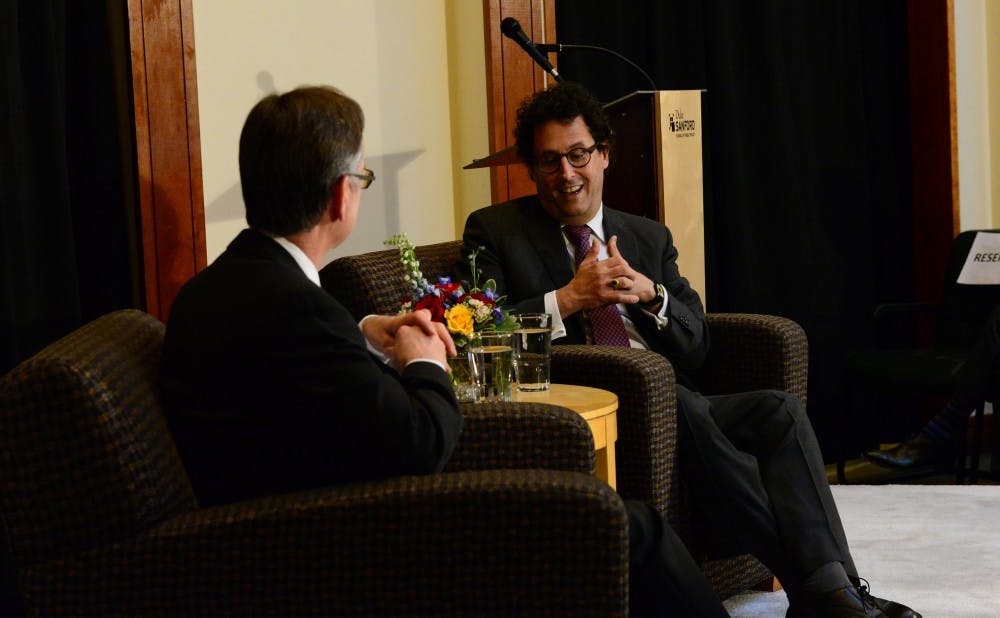Drawing parallels between Presidents Abraham Lincoln and Barack Obama, "Lincoln" screenwriter Tony Kushner tackled the modern state of politics with an eye on the past.
Kushner, renowned for his work weaving politics and history through drama, spoke at the Sanford School of Public Policy Wednesday. Best known for his 1993 Pulitzer Prize-winning play “Angels in America” about the AIDS crisis and homosexuality in the 1980s, he more recently was nominated for an Academy Award for his 2012 screenplay for Steven Spielberg’s “Lincoln."
At its heart, the film "Lincoln" is not just about Abraham Lincoln, who shares the spotlight as the hero of the story with the House of Representatives, Kushner said. In the contemporary political climate, in which people no longer share a "common language" with regards to politics, this aspect of the film is something that is particularly poignant for Kushner. To him, it's a sign of hope—a historical example that shows the House and Senate can rise to heights and prove the "thesis of democracy."
“I didn’t want to focus on some indomitable figure like Lincoln who would suddenly arrive to solve all of our problems,” Kushner said. “Because that means we’re screwed today."
Lincoln faced challenges greater than President George Washington—and today, Obama faces challenges as formidable as those Lincoln faced, Kushner said.
He noted with humor that although Lincoln had significant difficulty getting his agenda across, he was nonetheless aided by the fact that many of the people who had opposed him had seceded for the Confederacy. President Obama has no such luxury.
"Think how much easier it would be for President Obama if Mitch McConnell had seceded," Kushner added.
The similarities between Lincoln go beyond the political circumstances with which they dealt. Obama shares some of Lincoln's political savvy, mirroring his predecessor's caution in his approach to the topic of same-sex marriage, Kushner said. Obama's timing and sensitivity—about what the nation could hear and when it was prepared to hear it, Kushner added, was "positively Lincolnian."
"He was the first black president to run and he won," Kushner said. "And he couldn't say in 2008, 'I'm an African-American running for president—and by the way, I support gay marriage.' It just wasn't going to happen."
But if the nation does approve gay marriage, Obama will go down in the history books as having played an important role in the movement, Kushner added.
In some respects, the political deadlock of today is even more pronounced than that of Lincoln's day, he said. Where there once had been a language of communion, that language had broken down in the modern age. There's a genuine ideological rift that has made a shared language—the root of democratic politics—impossible.
People still have faith in democracy, but right now, they can't persuade each other, Kushner said. Civil discourse requires people to engage in and believe in the power of persuasion—which, in the past, has allowed great things to be accomplished.
The current political culture of individualism is to blame for the breakdown of meaningful conversations about political issues.
"[There are] people who are absolutely terrified to admit [that] anything other than a sort of nomadic, individual entity who's entirely self-sufficient exists," he said.
For conversations to happen, people need to have a genuine investment in a common ground, he added.
Historical drama can be poignant in a way that historical research is not, Kushner explained. It can remove some of the mortality of dry research and frame it in a way that resonates with people in the modern day, Kushner noted. By depicting political problems with strong parallels to our personal lives, political dramas thrive decades after their initial production.
“There are times when oppression is most noticeably coming from the outside beating down your door, but there are times when oppression is internalized in some way," Kushner said. "As long as there are human beings, these plays will continue to have their value. It outlives its moment of relevance.”
The event was sponsored by the Sanford School’s annual Crown Lecture in Ethics. Phillip Bennett, Eugene C. Patterson professor of the practice of journalism and public policy, facilitated the discussion.
Get The Chronicle straight to your inbox
Signup for our weekly newsletter. Cancel at any time.

